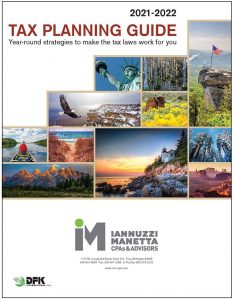
The following article is included in our 2021-22 Tax Planning Guide. Download the full PDF file now.
The tax strategies that can save you the most will depend on your particular situation. For example, if you’re a parent, a tax-advantaged education savings plan may be a smart move. Or, if you’re married, a credit shelter trust might save your family estate taxes.
Here are five more key tax savers for different types of taxpayers:
1. Investors: Review after-tax returns to evaluate the performance of investments.
The impact of taxes in a given year may not be significant. But over time, compounding can have a huge impact on a portfolio’s growth. For example, the difference between a $100,000 portfolio growing after tax at 8% vs. 6% a year amounts to almost $150,000 over 20 years.
2. Business owners: Watch out for buy-sell agreement tax pitfalls.
Buy-sell agreements control what happens to a business when a specified event occurs, such as an owner’s death or disability. Often such agreements are funded with life insurance, and proceeds are generally excluded from the beneficiary’s taxable income. But an exception is the transfer-for-value rule, under which proceeds will be taxable if an existing policy was acquired “for value” by someone other than the insured or certain other parties. The issue often arises when structuring or changing a buy-sell agreement using existing insurance policies.
3. Donors: Time donations to save more tax.
By considering current and future income tax rates before giving, you can significantly increase the tax benefit of your charitable gifts. Deductions are more powerful when you’re taxed at a higher rate. So if you expect to be in a higher tax bracket next year, you could save more tax by deferring a charitable contribution until 2022. On the other hand, if you expect to be in a lower tax bracket next year, you might benefit from accelerating charitable contributions into 2021.
4. Retirees: Choose your source of retirement cash wisely.
Generally, it’s best to use money from your taxable accounts first and let your retirement plan assets grow tax-deferred as long as possible. Also, remember that you may benefit from the long-term capital gains rate when you sell assets in taxable accounts, but you’ll be taxed at your higher, ordinary-income rate when you take distributions from traditional IRAs and 401(k)s. So you may want to take retirement plan distributions in years when you’re in a lower income tax bracket. If you must take required minimum distributions, make sure you follow the rules so you avoid penalties.
5. All taxpayers: Check with us before you take action.
This guide presents many other ways to minimize your taxes for 2021 and beyond. Please read it and note those sections that seem especially relevant to your situation. Then contact us to see which of these strategies — or others this guide doesn’t have room to cover — you should look into.
